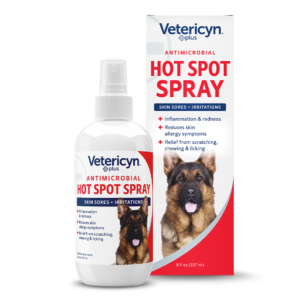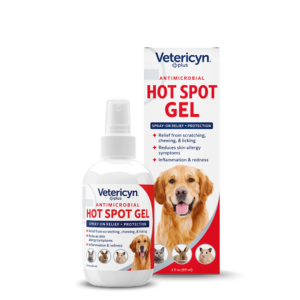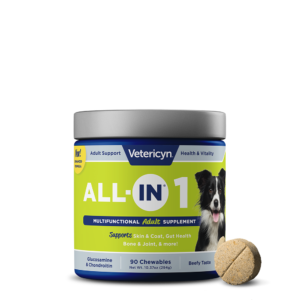For as long as they’ve been our best friends, dogs have enjoyed a reputation for possessing iron stomachs. From serving as the family “vacuum” to chowing down on gym socks and questionable trash pickings, pups can often handle gastric gauntlets with unmatched cool.
But as they age, dog stomachs tend to lose their resilience, and you may notice your companion wrestling with digestive issues more often.
Of course, as a pet owner, you want to do whatever you can to alleviate old dog stomach problems. The good news? With the right approach, you absolutely can.
Why Older Dogs Are More Prone to Stomach Problems
As puppies, dogs have a fairly robust digestive system. However, as they age, they often deal with weaker and slower digestive systems, as well as weaker gut microbiomes in general.1
Senior canines also face a higher risk of general health issues (like compromised kidneys, irritable bowels, and arthritis) that can contribute to digestive issues.
Older dogs are also more likely to take medication—some of which, like anti-inflammatories, can disturb the stomach and may cause abdominal pain.2
Common Causes of Stomach Issues in Senior Dogs
So, age generally raises your dog’s risk of a gurgly tummy. But what exactly is to blame for senior dogs struggling with significant or recurring stomach issues?
We can look to a few repeat offenders:
- Food allergies and intolerances – When the body rejects certain foods, it often becomes inflamed, triggering symptoms such as vomiting and diarrhea. In fact, canine food allergies represent one of the most common reasons for tummy troubles in older dogs.
- Infections and parasites – These creepy critters can bother any dog’s stomach, but older dogs, with their fragile digestive tracts, have a tougher time fighting back. Inflamed colons, nausea, and bloating are all classic signs of an invasion, often resembling gastroenteritis.3
- Organ disease and chronic conditions – Organ failure, especially kidney failure, generates toxic buildup that attacks the stomach lining.4 Chronic ailments, like pancreatitis, can also trigger inflammation and ongoing stomach pain.
- Medication side effects and stress – Medications can work wonders when it comes to keeping those tails wagging. However, as mentioned, some medications can tax a depleted digestive system, leading to side effects like nausea and other stomach issues.
For many veteran dogs, some combination of these factors is usually to blame.
Symptoms That Signal a Problem
As an owner of an older dog, you likely scan for trouble daily. If your dog’s digestive system starts acting up, some telltale signs will manifest. Look out for:
- Vomiting
- Diarrhea (most worrisome when consistent or repeating)
- Bloating
- Weight loss
- Appetite decline
If any of these symptoms flare up, alone or in tandem, it’s time to take a proactive approach.
When to Contact Your Veterinarian
Some senior dog digestive issues require prompt vet attention. If you start spotting these red flags, call your vet right away:
- Recurrent vomiting
- Bloody stool
- Dehydration (due to fluid loss from diarrhea and vomiting)
- Lethargic mood
Since older dogs have weaker defenses, these issues can rapidly escalate into severe illness. Prompt vet attention helps nip troubles in the bud before they become bigger issues.
Home Care and Remedies for Mild Stomach Upset
For many older dogs, recurring stomach upset is simply a fact of life. Fortunately, in many cases, you can handle mild tummy turmoil at home by offering your pup the following:
- Hydration and electrolyte support – Sometimes, pure water may be insufficient when dealing with diarrhea or other stomach issues. Supplement with Pedialyte (formulated for humans, safe for dogs) or unsweetened coconut water.4
- Bland diet choices – An upset stomach doesn’t need further stress, so feed your pooch easy-to-digest food like boiled chicken, turkey, or sweet potato.5
- Probiotics and gut health support – A gut bacteria imbalance can worsen existing stomach upset. Boost your dog’s natural defenses by bolstering with probiotics, like Vetericyn’s ALL-IN dog supplements. Adding senior dog vitamins and supplements to their care routine may also help maintain balance and overall wellness.
An older dog may take a bit longer to get over digestive issues, but caring home support often makes for a far easier journey.
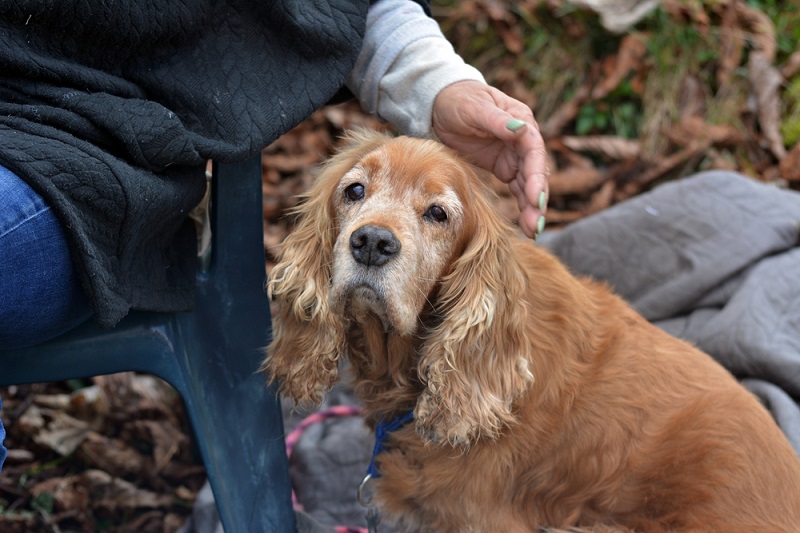
Preventing Future Stomach Issues in Older Dogs
Better than treatment, prevention offers the best strategy for diligent paw parents and their older dogs. And the earlier you tune in, the better your pooch’s prospects.
Ultimately, proactive digestive care boils down to a few key moves.
Gradual Diet Transitions
A sudden “shock to the system” rarely bodes well for an older dog’s stomach. While pups may lap up whatever finds its way into their bowl, an older dog relies more on consistency.
However, there are times when you may need to switch up your senior dog’s diet. This could be in response to separate health problems, a food allergy, or the need to calm persistent stomach troubles. Whatever the reason, you’ll want to execute the switch subtly, so as not to disturb their equilibrium.
The best approach is to gradually transition to the new food across the span of a week (or longer for especially sensitive canines).6 This gives their stomach time to adapt.
One time-tested method to pull off a gradual switch is the 10% approach7:
- Start by introducing 10% new food mixed with 90% of the old food
- Adjust to 20% new/80% old on day 2
- Continue shifting the ratio until you reach 100% new food
If your dog warms to the change, you may accelerate the progression—jumping from 40% new to 60% old, for example. On the other hand, if your pup starts displaying symptoms of distress or steadfastly refuses to eat, that’s a cue to pump the brakes.
Additionally, if the new food has a vastly different profile than the original (such as switching from kibble to wet food), a slower transition may be best. Old dog stomachs have their quirks, but with careful attention (and lots of love), you can accomplish a food swap with little to no trouble.
Monitoring for Sensitivities and Allergies
Since older dogs lack the immune resilience of puppies, food irritation can sneak up unnoticed. When undetected, allergies and intolerance can develop into deeper irritation—the sort that triggers stomach upset.
Stay ahead of tummy troubles by watching for signs of food intolerance, such as the emergence of:
- Old dog skin troubles – If you notice itchy patches popping up without a clear cause (like fleas or outdoor irritation), that’s red flag territory—especially when hot spots appear around the ears, paws, or snout.8
- Behavior changes – An abrupt drop in energy or out-of-the-blue restlessness can indicate underlying stomach stress. This is especially concerning if your dog’s attitude shifts immediately following mealtimes.
- Gastric distress – Unexpected nausea, flatulence, or diarrhea are all dead giveaways that something is amiss. If symptoms like these appear, assess your dog’s food intake and overall nutrition.
If you suspect a food intolerance (and especially if your vet agrees), an elimination diet should help. Elimination diets involve switching your dog to a completely new menu, then gradually reintroducing old items until the allergen is identified.
Stress Reduction and Routine Veterinary Check-Ups
Life has probably taught you that stress and anxiety don’t sit well with the stomach. The same is true for dogs. And for older canines, who crave stability and routine, sudden regimen shifts can easily throw them off their routine.
To help ease or prevent dog anxiety, try the following practices:
- Stick to a rhythm – Senior canines love predictable schedules, so strive to keep the same routine when it comes to walks, mealtimes, and sleep.
- Cultivate a tranquil environment – Fireworks, thunderstorms, the rumble of traffic—these disturbances can seriously stress your dog. Ensure that you offer them a safe and quiet space to retreat to when things become overstimulating.
- Provide light exercise – Old dogs may not bound through open fields or pursue squirrels anymore, but making sure they get daily exercise (even just a light jaunt around the block) helps cool frazzled nerves and brighten their mood.
In addition to maintaining a stress-free lifestyle, getting your pup to the vet for regular check-ups helps ensure that any potential problems are spotted and treated ASAP.9
Supporting Your Dog’s Comfort and Recovery
If your canine senior citizen has recently struggled with stomach issues, keeping them comfortable and well cared for makes for the best medicine. To that end:
- Support rest by providing comfy sleeping quarters
- Keep them hydrated by refilling their water bowl (and maintaining more than one)
- Provide companionship and love
Robust overall health provides the best defense against future stomach problems (and other ailments). Lend them an extra hand by providing a daily dose of Vetericyn ALL-IN supplements and keeping their skin and fur itch-free with Vetericyn’s handy Hot Spot Spray (formulated to provide instant relief from skin sores).
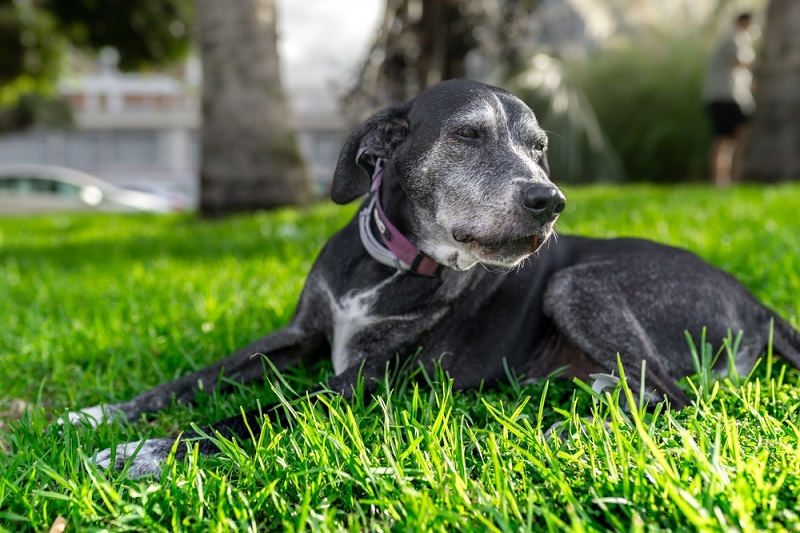
Vetericyn: Helping Your Senior Dog Stay Healthy and Comfortable
Old dog stomach problems are common, but they’re also manageable and even preventable. With diligent care and the right treatment, you can help your senior pooch live life to the fullest—without bloating, nausea, or abdominal pain.
At Vetericyn, our team works tirelessly to develop dog care products for both old and young pups. Whether your furry friend suffers from skin issues, stomach problems, or pesky eye irritation, we have solutions that support safe and comfortable recoveries. Explore pet care products today.
 Reviewed by C. Scott Van Winkle
Reviewed by C. Scott Van Winkle
Scott has been with Innovacyn for the past 11 years and has been working within the Burlingame portfolio of companies for the past 23 years. Scott brings a diverse background to Innovacyn. With an upbringing as the 5th generation on his families cattle ranch, Scott has a passion for animal health and the continuous improvement surrounding agricultural practices. Scott earned marketing and business management degrees from the University of Idaho and holds an Executive MBA from Pepperdine University.
Sources:
- National Library of Medicine. Gut Microbiome Composition is Associated with Age and Memory Performance in Pet Dogs. https://pmc.ncbi.nlm.nih.gov/articles/PMC7552338/
- PetMD. NSAIDs for Dogs: Everything You Need to Know. https://www.petmd.com/dog/general-health/nsaids-dogs-everything-you-need-know
- Merck Vet Manual. Gastrointestinal Parasites of Dogs. https://www.merckvetmanual.com/dog-owners/digestive-disorders-of-dogs/gastrointestinal-parasites-of-dogs
- VCA Animal Hospitals. Chronic Kidney Disease in Dogs. https://vcahospitals.com/know-your-pet/kidney-failure-chronic-in-dogs
- PetMD. How a Bland Diet for Dogs Helps With Stomach Upset. https://www.petmd.com/dog/nutrition/bland-diet-for-dogs
- PetMD. How to Switch Your Dog’s Food. https://www.petmd.com/dog/nutrition/how-to-switch-your-dogs-food
- PetMD. How to Transition Your Dog’s Food: Tips for Switching Safely. https://www.petmd.com/dog/general-health/how-to-switch-your-dogs-food-safely
- VCA Animal Hospitals. Food Allergies in Dogs. https://vcahospitals.com/know-your-pet/food-allergies-in-dogs
- VCA Animal Hospitals. Senior Dog Care – Special Considerations. https://vcahospitals.com/know-your-pet/senior-dog-care-special-considerations-for-dogs

